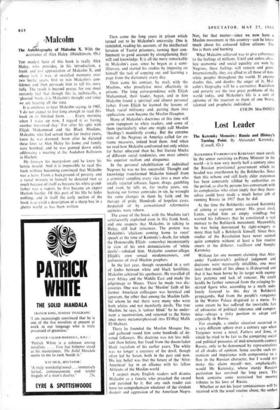1-Malcolm
The Autobiography of Malcolm X. With the assistance of Alex Haley. (Hutchinson, 45s.) THE modest hero of this book is really Alex Haley, who provides, in his introduction, a frank and just appreciation of Malcolm X, and whose task it was, at snatched moments over two hectic years, first to win Malcolm's con- fidence and then persuade him to tell his story fully. The result is beyond praise, for one must instantly feel that though this is, technically, a `ghosted' book, it is Malcolm's thought and voice we are hearing all the time.
It is ominous to hear Malcolm saying, in 1965, 'I do not expect to live long enough to read this book in its finished form. . . Every morning when I wake up now, I regard it as having another borrowed day.' For after his split with Elijah Muhammad and the Black Muslims, Malcolm, who had served them for twelve years, knew he was doomed. Soon after he dictated these lines to Alex Haley his home and family Were bombed, and he was gunned down while addressing a meeting at the Audubon Ballroom in Harlem.
He foresaw his martyrdom and he knew his heroic mould. And it is impossible to read this book without becoming convinced that Malcolm was a hero. From a background of poverty, and a racial mixture in himself he detested (not so much because of itself as because his white grand- father was a rapist), he first became an expert Harlem hustler. Of this part of his life he hides nothing, and in itself the early section of the book is as vivid a description of a sharp boy in a ghetto world as has been written. Then came the long years in prison which turned out to be Malcolm's university. One is reminded, reading his account, of the intellectual heroism of Tsarist prisoners, turning their con- finement to good account by strengthening their will and knowledge. It is all the more remarkable in Malcolm's case, since he began as a semi- illiterate, and started his studies by imposing on himself the task of copying out and learning a page from the dictionary every day.
Then came his contact, by mail, with the Muslims, who proselytise most effectively in prisons. The long correspondence with Elijah Muhammad, their leader, began, and in him Malcolm found a spiritual and almost personal father. From Elijah he learned the lessons of black racial militancy and, putting them into application, soon became the Muslim Dauphin.
Many of Malcolm's doctrines of this time will seem repugnant to white readers, and some of them (particularly what one might call Muslim 'theology') manifestly cranky. But the extreme state of the Negroes in AmericA called for ex- treme measures, indeed bred them. And when we read how Malcolm confronted not only whites far better educated than he, but literate blacks of different social tendencies, one must admire his superior realism and eloquence.
In the personal rehabilitation of individual' Negroes he was no less successful. Thought and knowledge transformed Malcolm himself from a criminal sampling every vice into a man who totally rejected tobacco, liquor, drugs, gambling and even, he tells us, for twelve years, sex. Seeking out former comrades in sin, he wrought the same changes in them by faith and the therapy of pride. Hundreds of hopeless cases, despaired of by conventional reformative agencies, were reborn.
The cause of the break with the Muslims isn't satisfactorily explained even in this frank book, and one suspects that Malcolm, in talking to Haley, still had reticences. The pretext was Malcolm's 'chickens coming home to roost' speech at the time of Kennedy's death, for which the Honourable Elijah—somewhat inconsistently in view of his own denunciations of 'white devils'—rebuked him. Malcolm counter-alleges Elijah's own sexual misdemeanours, and jealousies of rival Muslim prophets.
In the last year, though suspended in a sort of limbo between white and black hostilities, Malcolm achieved his apotheosis. He travelled all over Africa and the Middle East and made the pilgrimage to Mecca. There he made two dis- coveries. One was that the 'Muslim' faith of his former American colleagues was heretical and ignorant, the other that among the Muslim faith- ful whom he met there were many who were both whites and not manifestly devils. The true Muslim, he says, is 'colour blind.' So he under- went a reconversion, and returned to the States once more metamorphosised into El-Hajj Malik El-Shabazz.
There he founded the Muslim Mosque Inc. and gathered round him some hundreds of de- voted followers. His doctrine was not less mili- tant than before, but freed from the doom-laden black racialism of his earlier years. The white was no longer a creature of the devil, though often led by Satan, both in the past and now. His key belief was that the future of the 'Afro- American' lay in an alliance with his fellow Africans of the Muslim world.
I suspect many English readers will dismiss Malcolm as a fanatic who preached the sword and perished by it. But any such reader can have no comprehension whatever of the virulent despair and aggression of the American Negro. Nor, for that matter—since we now have a Muslim movement in this country—can he know much about his coloured fellow citizens. The fire is there and burning.
What Malcolm achieved was to give coherence to the feelings of millions. Until and unless abso- lute economic and social equality are won by Negroes, these feelings will remain and grow. Internationally, they are allied to all those of non- white peoples throughout the world. If anyone doubts this, and doubts the anger of it, Mal- colm's biography will be a corrective. Racialism and poverty are the two great problems of the world today, and Makolm's life is a sort of ,epitome of the reaction to them of one brave, talented and prophetic individual.
COLIN MAcINNES


































 Previous page
Previous page